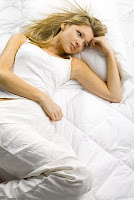Seven hours sleep a night best for health
Fewer than seven hours a night linked to heart disease
People who regularly sleep more or fewer than seven hours a day could be increasing their risk of heart disease, new research finds.
In the study, the participants were asked to fill in questionnaires about their health and lifestyle, including questions about their sleep patterns.
- Being unable to fall asleep within 30-40 minutes of going to bed
- Needing pills or alcohol to help you fall asleep at night
- Waking repeatedly during the night
- Waking too early in the morning and not being able to get back to sleep
- Feeling tired after a night’s sleep
- Feeling tired during the day
- Having headaches, difficulty concentrating and generally feeling irritable
Main Causes of Insomnia
Insomnia can be temporary and may start after a stressful event in your life - family death, unemployment, divorce - or it can be chronic and continue for months or even years. There are a number of possible causes, but they usually include:
- Environmental factors - nigh-time noise, room temperature, uncomfortable bed
- Lifestyle - diet, alcohol intake, irregular hours at work
- Psychological – stress, anxiety, grief, depression
- Sleep disorder – apnea, restless legs syndrome, narcolepsy
- Other medical conditions which have insomnia as a symptom - under-active thyroid, some cancers
Create the perfect sleep environment
De-clutter the bedroom
Bedrooms should be used only for sleeping and sex – not working, eating, sleeping or watching television. Your brain needs to associate your bedroom with sleep.
If you have a television or computer in the room, then it is time to de-clutter and move them elsewhere.
You should aim to make your bedroom a dark, quiet and peaceful environment in which to rest after a hard day’s work. To do this:
- Make sure you have a bed which is comfortable. Mattresses are supposed to be changed every 10 years. If the mattress sags, put a board under it until you can afford to buy a new one. You will also be doing your back a favour!
- Fresh sheets and pillow cases may also help
- If the morning sun is causing you problems, invest in heavier curtains or lining, or wear an eye mask
- If your partner snores, buy some soft ear plugs
- Keep the room at a decent temperature, and well ventilated – not too hot in the summer or too cold in winter
Create a sleep routine
Break the cycle of insomnia
Establishing a good sleep routine is one of the best ways you can help yourself to sleep.
- Go to bed and get up at the same time each day, even at weekends
- As bed time approaches, start to wind down. Avoid television or anything which is mentally demanding in the hour before bedtime
- Have a warm relaxing bath, followed by reading and a warm drink (no caffeine or stimulants) or listen to some quiet music
- If you don’t fall asleep after 20-30 minutes, then get up and go to another room. Sit in a comfortable chair, perhaps with a cosy throw, relax and read a book or magazine. When you feel sleepy, go back to bed again. Try some breathing exercises to help you relax. If you still can’t sleep, repeat the process. Don’t worry about not sleeping; relax and sleep will come to you
- Only sleep in bed. Try to avoid taking a nap during the day, especially in the early evening or else you will find it difficult to sleep again at night. You need to eliminate the factors which contribute to insomnia.
These simple steps may seem straightforward enough. But bad habits are difficult to break. If you stick with it, you really can break the cycle of insomnia.
Snooze and booze
They really don't mix!
In a government survey carried out earlier this year, 58% of those questioned were unaware that drinking above the daily guidelines can lead to problems sleeping. In fact, alcohol along with caffeine and nicotine is a major sleep disruptor.
As we said, alcohol has good PR! Part of the reason for this is that alcohol can help you fall asleep faster. It does this by suppressing the production of adrenaline which keeps you alert. However, within hours the body tries to counteract this effect by producing more, causing you to wake up or sleep poorly.
Alcohol is also a diuretic, and encourages the body to excrete fluid. So you may have to visit the loo during the night.
Alcohol before bed can cause you to fall straight into a deep sleep, only entering REM sleep once it has been metabolized by the body. As you wake more easily from REM sleep, many drinkers wake early in the morning feeling un-refreshed. We need both types of sleep, in the correct amounts.
Even drinking at "Happy Hour" can affect the normal sleep cycle up to six hours later.
If you are trying for a good night's sleep, stick to the daily recommended limits, or cut back altogether.
The daily recommended amounts:
- Men should not regularly drink more than 3-4 units of alcohol a day
- Women should not regularly drink more than 2-3 units of alcohol a day







Thanks for this info, u dey here cos only naija guy can get this far, o boy more of that and please i love those wonderful exploites
ReplyDelete